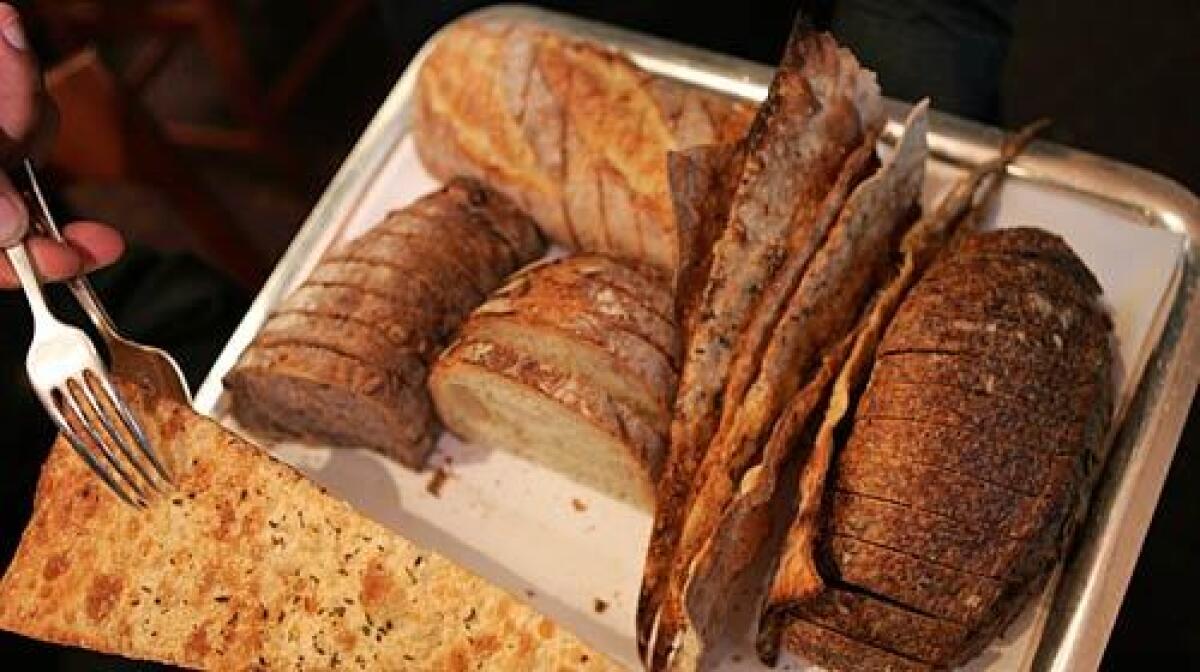Diners, stand up for your rights!

You arrive at a restaurant in time for your 8 o’clock reservation; your friends haven’t arrived yet. You’ve spent 45 minutes stuck in traffic and you’re wiped out. You’d like to be shown to the table. “I’m sorry,” says the hostess, barely looking up from her computer screen, “we do not seat parties until they are complete. You’re welcome to wait at the bar.”
You wait at the bar. Your friends arrive, and you ask to have the bar tab transferred to your dinner tab. “I’m sorry,” says the bartender, “but I’ll need you to settle up here.”
You’re shown to the table, and the place is half-empty. Why couldn’t they have seated you immediately? Nevermind. You order. The server (“Steve”) brings the plates and interrupts your conversation to ask: Who had the salmon? Who had the steak? Halfway through, the wine glasses are empty; the bottle’s out of reach. Steve shows up after you start waving frantically, and he dumps the wine into two of the table’s glasses. He holds up the empty bottle with a smile. “Would you like another bottle?”
Bad service in Los Angeles restaurants has reached epidemic proportions.
When we dine out, we like to be welcomed. We like to be made to feel that we matter. We like to feel taken care of. At high-end restaurants in L.A., we pay dearly for the dining experience -- prices have gotten crazy expensive. We’ll fork over the dough, but we’d like more than just a properly cooked steak in return. The restaurant business is about hospitality, right? Well, instead of hearing about a restaurant’s rules and policies, we’d like to be shown a little hospitality.
Of course there are restaurateurs who understand that the way to succeed is to make the guest feel she is taken care of -- and you can find that kind of great service not only at some of the most expensive restaurants in town but also at tiny neighborhood cafes. But, alas, good service is an endangered species.
That is why I humbly propose a diners’ bill of rights.
After consulting with other diners and with restaurant professionals, I state these principles in the hope that one day it will be possible to get acceptable service in restaurants throughout the Southland.
1. Hospitality. “Hospitality exists when you believe that the other person is on your side,” writes Danny Meyer in his book “Setting the Table.” Meyer is founder and co-owner of 11 restaurants in New York, including Union Square Cafe, which long has been known for its exemplary service. Further, “hospitality is present when something happens for you. It is absent when something happens to you. Those two simple prepositions -- for and to -- express it all.” All too often in L.A., diners are made to feel that something happens to us. That needs to change.
2. Equal opportunity. Each diner has an equal right to any given table. Restaurants shall not show preference in granting reservations to celebrities or their handlers. If you’re a below-the-line sound-effects editor, you have a right to the same table as an above-the-line director, and to the same treatment by the wait staff.
3. Time of your choice. A restaurant shall not unreasonably withhold tables. You shall be given a reservation at the time you prefer when the restaurant has tables available. If you ask for a reservation at 7:30 and the restaurant has plenty of free tables at that time, it shall not refuse that time and offer you a 6:30 table instead. The corollary is that if you cannot show up, you shall cancel the reservation in a timely fashion.
4. Courteous greeting. You have the right to be greeted courteously at the door. That means the hostess immediately stops what she is doing and helps you. It’s a lesson corporate American retailers have learned, but white-tablecloth restaurants, it seems, haven’t gotten the memo.
5. Timely seating. When you arrive on time, you shall be seated expeditiously. If you wait more than 15 minutes for a reserved table, the management should apologize and offer a drink at the bar. Of course, a host can’t always accurately predict when tables will be vacated, but Donato Poto, co-owner of Providence in Los Angeles, says even 15 minutes is too long for guests to wait. If the restaurant is having a problem seating the guest right away, he says, after five or 10 minutes at the most, “the minimum of courtesy is to offer them a cocktail at the bar or a glass of Champagne for sure.”
6. Wait at the table. If you arrive at the time of your reservation and your table is ready, you shall be promptly seated, if you wish, not asked to wait for your party to be complete. “If you make a reservation for 8, the table should be yours at 8,” Poto says.
7. Pull out your wallet only once. If you have a drink at the bar, the tab shall be transferred to your table; you shall not be asked to settle up at the bar. It’s the restaurant’s responsibility to make sure the bartender or bar server receives his or her share of the gratuity; that is not your problem.
8. Waiter’s anonymity. You have the right not to be told your server’s name. “Folks don’t come in to make new friends with the service staff,” says Martha Keller, adjunct professor of hospitality at the Culinary Institute of America at Greystone in Napa.
9. Dinner conversation. Do we have to pull out the decibel meter, kids? Part of dining is conversing. Music so loud that you have to shout to be heard is unacceptable.
10. A wine list. Every adult diner should be offered one, just as we are offered a menu. Restaurateurs, welcome to the 21st century! Many of us -- even girls -- are interested in wine. We might leave ordering it up to the host, but we’d still like to see what’s on offer and talk about it. (Note: We’ll cut the places with 30- or 40-page wine lists some slack on this one.) Further, you have the right to be spared fanciful descriptions of wine. If Steve can’t describe a wine without inventing, he shall fetch the wine director.
11. Not to be told the server’s favorite dish. You have the right to a simple, accurate description of any dish you ask about yet be spared lengthy lists of ingredients and explanations of cooking methods. And what of the diner who asks whether the halibut or the tuna is better? The waiter, Poto says, “should give a full description and guide them. They could say, ‘Well, the halibut has a little more delicate touch; it’s a little more citrusy.’ They should definitely not say the halibut’s better than the tuna; that means the tuna’s bad and it shouldn’t be on the menu.”
12. Salt on the table. Rare is the kitchen that gets seasoning right every time. Please spare us embarrassing the chef by having to ask for salt.
13. Tap water. You have a right to be offered tap water without feeling stigmatized. The tap water shall be filtered. Unless there are overriding drought conditions, the water shall be replenished throughout the meal. And if we do order bottled water, no funny business (pouring gigantic glasses).
14. Your daily bread. Bread is an inalienable dining right, and you shall be offered it not long after being seated. You have the right to a bread plate in white-tablecloth establishments, you have the right to keep that bread plate through the cheese course (if any), and the bread shall be replenished throughout the meal. “Bread and water are standards of graciousness,” Keller says. “You don’t withhold it like it’s some treat.”
15. Right of refusal: wine. You have the right to refuse a wine that is not in good condition, and you shall not be required to pay for it. If Steve doesn’t know what a corked wine is, he should fetch someone who does.
16. Right of refusal: food. Has the server asked how you’d like your steak cooked? You have the right to send it back if it’s not cooked as requested.
17. Eating with the rest of your party. For any given course, all the diners at a table shall be served at the same time. No one likes to start before everyone else nor let their food get cold.
18. Proper level of wine in glasses. Wine shall be replenished as necessary, but servers shall not overfill the glasses. You have the right to keep the bottle on the table and pour it yourself if the server’s not attentive.
19. Prices of specials. The waiter must tell you all the specials and their prices. Corollary: Apparently diners do exist in this town who absolutely don’t want to know; we’ll have to leave it up to them to glare at the waiter if it looks as if he’s about to mention prices.
20. Silverware. You have the right to receive new silverware with each course; busboys should not ask us to keep our icky forks. You have the right to a cocktail fork when ordering oysters and a steak knife when ordering steak or when your lamb shank’s undercooked.
21. Speedy service. You have the right not to be kept waiting unduly long between courses. If a course hasn’t arrived 15 minutes after the last one has been cleared, you’re entitled to an explanation. Poto finds that too lax: “I think 10 minutes is the most,” he says.
22. Privacy. You have the right not to have your dinner conversation interrupted by a server. At the Culinary Institute, Keller teaches that after placing the food on the table, waiters should approach the table only “if the body language or eye contact from the table suggests there is some need from the table for the server.” Under no circumstances should the waiter join in your dinner conversation unless expressly invited to.
23. Pleasure in dining. You shall not be asked if you’re “done working on” your plate. Dining is not work; it is pleasure.
24. Not to be rushed. You have the right to keep your plate until everyone in your party is finished and have placed their silverware in the “finished” position.
25. VIP treatment. If you are not a VIP, you have the right to the same service as a VIP.
More to Read
Sign up for The Wild
We’ll help you find the best places to hike, bike and run, as well as the perfect silent spots for meditation and yoga.
You may occasionally receive promotional content from the Los Angeles Times.










